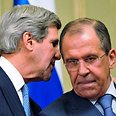
After months of deadlock, diplomacy gets another chance in Syria
Analysis: Russia's push for Syrian peace talks attempt to block US intervention in civil war
If Russia has decided to make a new diplomatic push to drag Syria's warring parties into peace talks, it may be because of signs that the United States could slowly get sucked into the conflict.
The two major powers' joint announcement that they would try to bring together representatives of President Bashar Assad's government and the rebel forces fighting to oust him represents their first serious diplomatic initiative in nearly a year.
Related stories:
- The Russian card: S-300 to prevent intervention in Syria
- Syria: We'll respond harshly to future Israeli attacks
- Syria: Thousands of rebel fighters defect to al-Qaeda
After lengthy talks in Moscow on Tuesday, the United States and Russia said they would try to breathe life into a carefully negotiated agreement they both endorsed in June 2012 that left open the question of whether or not Assad must leave power.
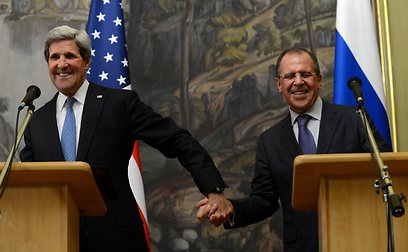
Lavrov, Kerry in Moscow (Photo: AFP)
Their idea is to prod both sides to the negotiating table - possibly in Geneva by the end of May - to try to end the war and to get them to form a transitional government by mutual consent.
That framework to end the conflict, in which more than 70,000 people have been killed since it began in 2011, was laid out in the so-called June 30, 2012 Geneva Communique.
After showing little interest in getting it implemented, Moscow's apparent willingness to revive the idea may reflect concern that US President Barack Obama is rethinking his opposition to some kind of military intervention in Syria.
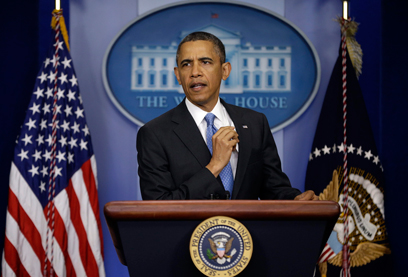
President Obama (Photo: AP)
Signs of this include the White House's acknowledgement on April 25 that US intelligence agencies believe the Syrian government probably used chemical weapons against its people, something Obama had previously described as a "red line".
There are also indications the conflict is widening - Israel bombed targets in Syria twice at the weekend - and concerns about the prominence of Islamist militants, some loyal to al-Qaeda, among the armed opposition, as well as about the role of Iran and its Lebanese Hezbollah ally in supporting Assad.
Fear of intervention
Finally, there are louder American voices urging Obama to arm the rebels, among them Senator Robert Menendez, the chairman of the influential Senate Foreign Relations Committee who introduced legislation to that effect on May 6.
"Of all those arguments, I think the greatest Russian fear is that the US and the West are headed for some form of military involvement in Syria, one way or another, and that is likely to have been operative in their minds," said one Western diplomat who spoke on condition of anonymity.
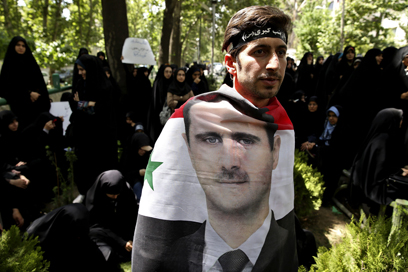
Iranian demonstrator wrapped in Assad flag (Photo: AP)
A Russian Foreign Ministry statement alluded to that fear on Monday. Expressing alarm at the Israeli air strikes, it said Russia was "seriously concerned by the signs of preparation of global public opinion for possible armed intervention" in Syria.
Obama has made no secret of his desire to avoid military entanglement in Syria as he has brought US troops home from Iraq and is trying to wind up the US war in Afghanistan.
Diplomats said if this were to change, arming selected rebel groups is a likelier first step than direct intervention such as a bombing campaign to take out Syrian air defenses and impose no-fly zones, let alone sending in US troops.
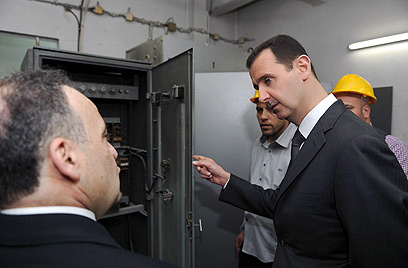
Assad during public visit on May 1 (Photo: EPA)
Russian Foreign Minister Sergei Lavrov said after talks with Kerry on Tuesday that Moscow was not fixated on Assad's future.
"We do not care about the fate of particular people. We care about the fate of the Syrian people. And the fate of the Syrian people, the fate of Syria, the fate of specific people must be decided by the Syrians themselves," he said.
Diplomats voiced some skepticism about whether Russia was truly prepared to cut Assad loose - its position on this has shifted little in practice over the past two years.
"The way they committed to it publicly is new but on substance, it's not really clear to me ... how much they are going to push Assad to give a chance to these negotiations," said another diplomat, noting that "this whole dance on should Assad leave, when should he leave" remained unresolved.
Russia has insisted Assad's exit cannot be a precondition for talks, a point Washington appears to have conceded.
The United States has said Assad must go but it has not explicitly made this a condition for holding talks, and it may be open to some kind of formula where Assad might step down later, assuming he is willing to leave power at all.
Diplomatic Ambiguity
The Geneva Communique did not demand Assad's removal and it was vague on who might form a transitional government, saying: "It could include members of the present government and the opposition and other groups and shall be formed on the basis of mutual consent."
The United States has long argued that the phrase "mutual consent" meant the opposition could veto any role for Assad.
Diplomats said that while Russia might be able to get the government to the negotiating table, it would be hard for the United States and its Western and Arab allies to persuade the opposition to swallow the bitter pill of going to talks with the possibility that Assad might stay in power for some time.
Washington, however, could tell the opposition further US support was conditional on their participation in the talks.
But the Western-backed, Cairo-based opposition National Coalition, which welcomed the US-Russian initiative, while saying hopes for democracy rested on Assad's exit, has almost no control over rebel forces on the ground.
Jon Alterman, director of the Middle East program at the Center for Strategic and International Studies in Washington, said it was worth exploring how hard the Russians might be willing to lean on Assad.
"There had been a sense the Russians were totally immovable on Syria and it's good to question that, both in the wake of increasing concerns about chemical weapons use and in the wake of concern that extremists are gaining a greater foothold," he said.
Mutual Concerns
Alterman said the United States and Russia have some shared interests in Syria, among them concern that "extremist activity" in Syria could spread through the Middle East and Central Asia.
"A significant part of the (Syrian) population is afraid that ... the regime will be overthrown," Lavrov said on Tuesday.
"It is not because they like this regime. It is not because they like the ongoing, horrific events in Syria ... but because they are afraid that if those who fight the regime win, then Syria, from a multi-ethnic, multi-confessional state ... will turn into a country where extremists rule the day," he said.
"And (while) it is not spoken out publicly today, this opinion is shared by all my interlocutors. This is why ... we have tried (to) put forward an initiative to unite all groups represented both by the regime and by the opposition."
Doubts remain over whether Moscow has significantly shifted policy or is buying time by showing it is trying to cooperate with the Western powers over Syria, at a time when Washington also wants to show its own public it is seeking a breakthrough.
In one sign that Russia may by no means have jettisoned its support for Assad, the Wall Street Journal reported on Thursday that Israel has told the United States that a Russian deal to sell Syria advanced ground-to-air missile systems to Syria was imminent. Moscow did not immediately comment on the report.
Alterman also noted Russia's deep reluctance, following the Western intervention that helped Libyan rebels topple Muammar Gaddafi, to see the West help overthrow another Arab leader.
"Russian concern with reinforcing the precedent of outside intervention and with the United States displacing Russian allies with American ones has driven Russia to opposing international cooperation on replacing the government of Assad."
Alterman said reaching a peace settlement in Syria "will be extraordinarily difficult but not impossible and it's probably a better outcome for the Russians than completely losing control".
- Receive Ynetnews updates directly to your desktop










